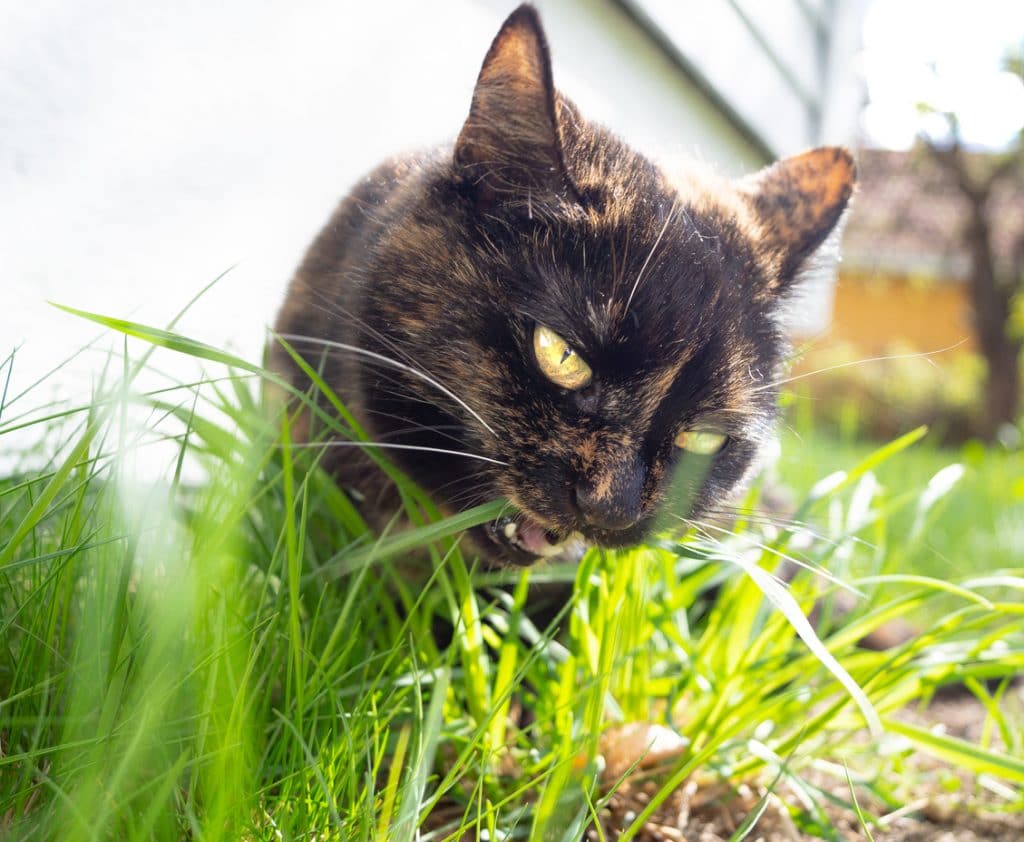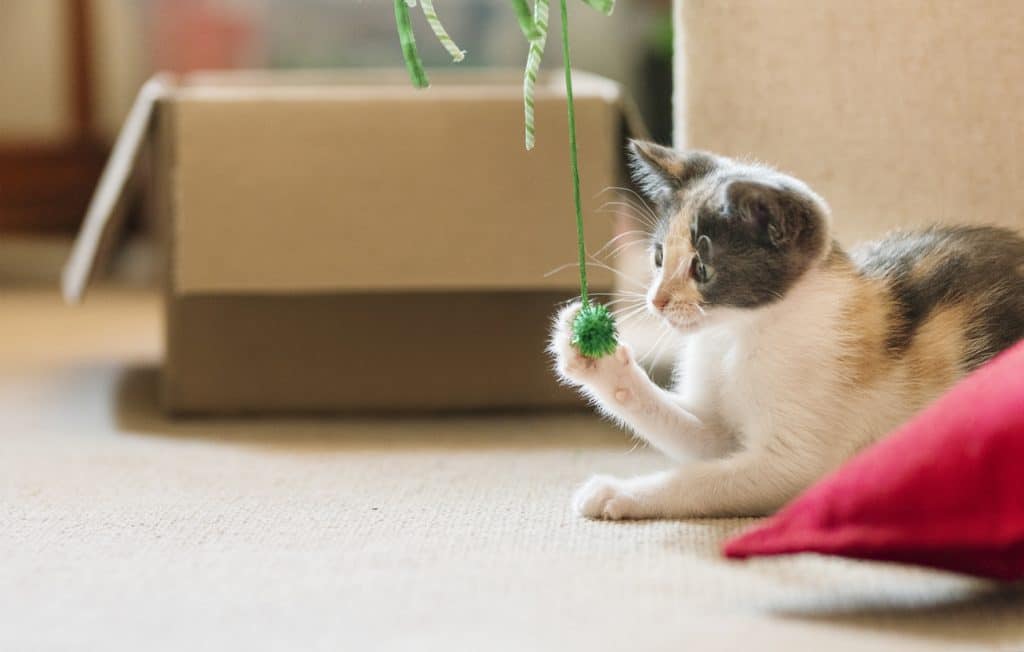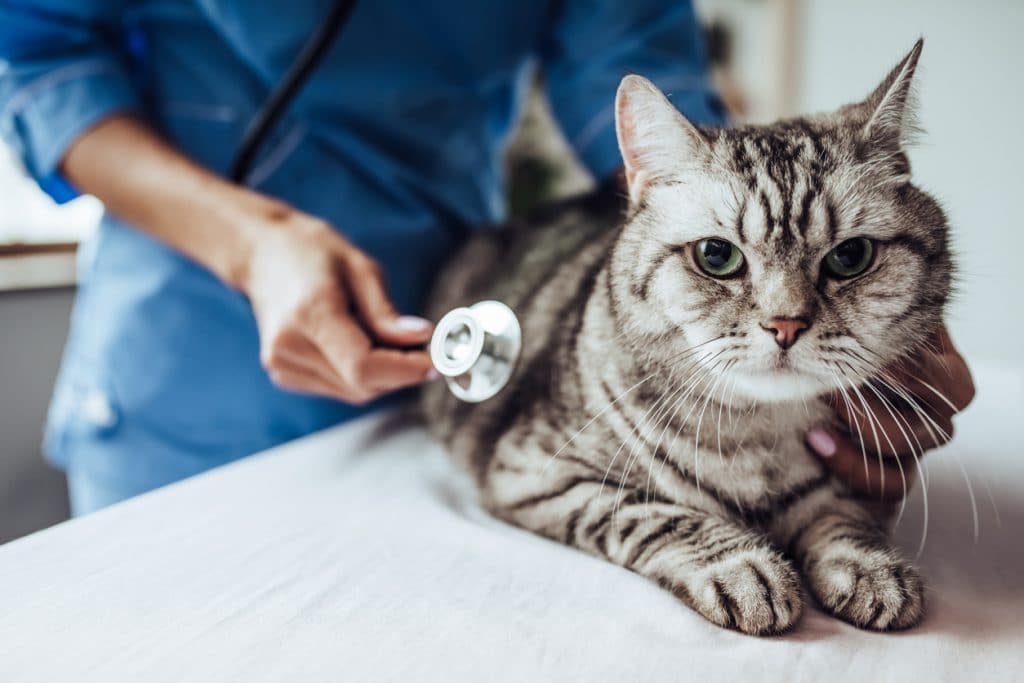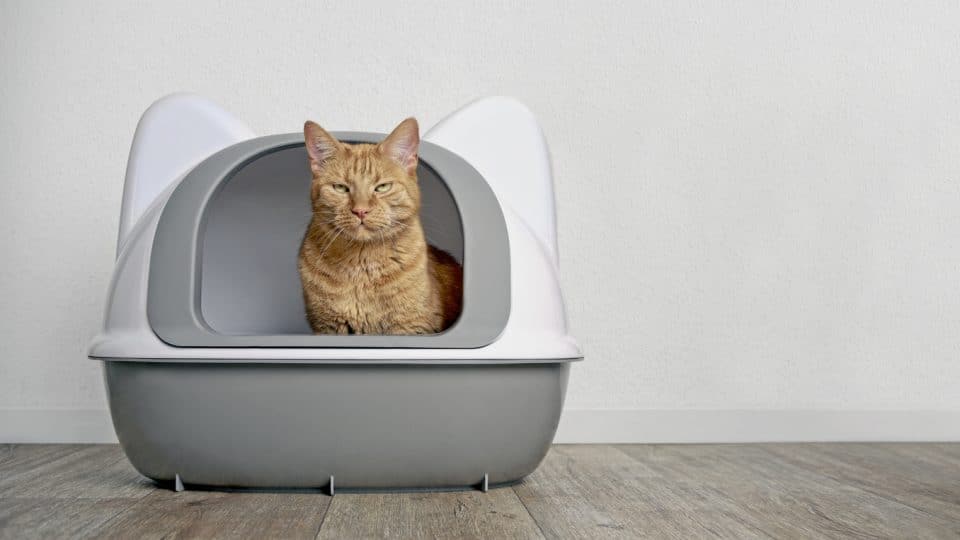It’s true—everyone, even our cats, poop. Normal cat poop “is small, infrequent (a few times per week), very dry (often crumbly), and virtually odorless,” Margaret Gates, Director of the Feline Nutrition Foundation tells The Dog People. Large, soft, and very smelly poops aren’t natural she says, but are often seen in high-carb diets. A cat with diarrhea will have liquid-like poo with a high-stink rating—and it’s a sign that your cat’s gastrointestinal (GI) system is out of whack.
If your cat has diarrhea but seems fine, they could be passing something that upset their stomach. Acute diarrhea should clear within a day or two with no need for medical care. But, if the diarrhea is persistent or is accompanied by other symptoms, a call to your vet is recommended.
If your cat or kitten has diarrhea—don’t fret! We’ve spoken to a panel of experts who have broken down the causes, clarified when to call the vet, and have all of the at-home and diet recommendations to get your furry pal back on track.
Cat Diarrhea: When Should I Call the Vet?
Continuing diarrhea, or chronic diarrhea, is reoccurring or lasts for 14 days or more. It shouldn’t be a wait-and-see situation and requires an appointment with your vet to get to the root of the cause—typically within three days of onset. When left untreated, diarrhea can lead to dehydration, electrolyte imbalance, malnutrition, and shock.
Short-term and self-limiting diarrhea, or acute diarrhea, doesn’t always need medical attention from your vet. Acute cat diarrhea can go away on its own once your cat passes what has upset their stomach or a stressor from the environment is removed. If your cat’s diarrhea includes fresh blood, is tar-like, or is accompanied by other symptoms like vomiting, fever, or lethargy—it’s best to call your vet.

iStock/Vladdeep
Why Does My Cat Have Diarrhea?
The list of potential reasons why your cat has diarrhea is long. By noting other symptoms along with the severity and persistence of diarrhea, your vet can better diagnose the cause.
Causes of Cat Diarrhea |
Symptoms |
| Stress or anxiety | Increased vocalization, clinginess, hiding, trembling, withdrawing, reduced activity, overgrooming or licking and biting at self, throwing up, sudden urination or urination outside of the litter box, sudden bowel movements or bowel movements outside of the litter box, diarrhea, loss of appetite, and destructive behavior |
| Foreign objects | Vomiting and anorexia with less common symptoms of diarrhea, weight loss, lethargy, and signs of septic shock |
| Change in diet, especially when sudden | Vomiting, diarrhea, and lack of appetite |
| Overeating or eating fatty foods | Vomiting and diarrhea |
| Antibiotics | Skin rash, drooling, lack of appetite, and diarrhea |
| Biologically inappropriate diet | Vomiting, diarrhea, gas, and abdominal pain |
| Motion sickness | Excessive vocalization, pacing, restlessness, licking of lips (nausea), excessive drooling, lethargy, vomiting, and diarrhea |
| Bacterial infections, including Salmonella | Diarrhea (with mucus, bloody, or watery) and abdominal pain |
| Toxins | Diarrhea, vomiting, drooling, seizures, unsteady gait, and lethargy |
| Hyperthyroidism | Increased appetite, weight loss, increased thirst and urination, vomiting, and diarrhea. |
| Irritable bowel syndrome (IBS) | Sudden onset of diarrhea (sometimes with mucus), weight loss, vomiting, lethargy, changes in appetite, abdominal bloating and gas, and painful passing of stool. |
| Irritable bowel disease (IBD) | Chronic diarrhea (sometimes with mucus), weight loss, vomiting, lethargy, changes in appetite, abdominal bloating and gas, and painful passing of stool. |
| Feline Immunodeficiency Virus (FIV) | Symptoms vary depending on the stage of FIV. Swollen lymph nodes, fever, weight loss, decrease in appetite, depression, diarrhea, chronic infections including of the eyes, ears, skin, respiratory system, and urinary tract, inflammation of the mouth, and seizures. |
| Feline coronavirus infection (FCoV) | Typically asymptomatic, mild diarrhea |
| Feline infectious peritonitis (FIP) | Nonspecific signs of disease such as loss of appetite, weight loss, depression, diarrhea, and fever. Non-effusive (dry) may include neurologic symptoms including seizures and abnormal or uncoordinated movements. Effusive (wet) may include the accumulation of fluid in body cavities and difficulty breathing |
| Food allergies | Skin irritation, including redness, itchiness, and rash, vomiting, and diarrhea. |
| Parasites, including tapeworm, roundworms, hookworm, giardia, and others | Symptoms vary depending on the type of parasite. Diarrhea (sometimes dark and tar-like), weight loss, dehydration, weakness, coughing, pale gums, and presence of worm segments in feces |
| Cancer | Symptoms vary but may include weight loss, behavioral changes, difficulty breathing, drooling, enlarged lymph nodes, lethargy, pain or discomfort, vomiting, and diarrhea |
Can indoor cats get diarrhea?
Yes, all cats can get diarrhea. If your cat is indoors only, they may be less likely to experience diarrhea caused by certain parasites and gastrointestinal infections than outdoor cats. While less likely, indoor cats aren’t immune to parasites brought in from the outdoors and should see their vet for a preventative fecal test at least once per year.

iStock/Otto Fearnley
Is diarrhea in kittens common?
“Kittens have very immature digestive systems,” explains Sarah Machell, DVM, Medical Director of Vetster. They are very curious and prone to exploring by tasting, licking, and eating. Plus, their young systems are susceptible to nasty infections and parasites.
Diarrhea in kittens should always be discussed with a vet, Dr. Machell says. “So many factors can play into a kitten with soft stool or diarrhea, that only a veterinary professional would have the expertise to guide a decision on what to administer in each particular situation.” Kittens put all their resources into growing. So, they don’t have extra nutrition or hydration to spare like adult cats do. This puts kittens at risk of rapid decline in health when tummy troubles arise.
How Is Cat Diarrhea Treated?
Diarrhea is not a disease that can be treated. Diarrhea is a symptom of an underlying disease, gut imbalance, or condition. Acute diarrhea typically doesn’t require treatment in adult cats and is self-limiting. If your cat’s diarrhea is persistent, you’ll want to talk to your vet about medications, diet changes, and other remedies to treat the underlying cause.
Vet-prescribed treatment
Dehydration is common in pets with diarrhea. So, your vet may begin treatment with IV fluids. They’ll likely do a hands-on examination of your cat’s abnormal and might need to perform a rectal examination or x-rays. If you have a fresh fecal sample, your vet might want to examine that, too.
Depending on your vet’s findings, treatment for the underlying cause of diarrhea could be as simple as a vet-prescribed diet, a round of deworming medicine, or antibiotics. Other causes for GI upset like an obstruction could require surgery. Infectious and chronic diseases will include a long-term treatment plan recommended by your vet. Your vet may prescribe antidiarrheals to provide relief while treating the underlying cause(s).

iStock/NickyLloyd
Diet changes
Before treating cat diarrhea with a change in diet, it’s best to talk with your vet about the underlying cause. If your vet pinpoints diet as the cause of diarrhea, ask if these feline-friendly diet changes could help:
- Increasing fiber with plain pumpkin puree, psyllium husk supplements, or a high-fiber cat food
- Decreasing fiber intake
- Adding GI-boosting probiotics to meals
- Feeding a low-carb, high-protein diet
At-home treatment
Not all cases of diarrhea require a trip to the vet or long-term dietary changes. If you’re wondering what to give your cat to help treat diarrhea as a symptom, Dr. Gary Richter, Rover’s resident veterinarian on The Dog People Panel says, “Simple diarrhea due to dietary indiscretion can often be treated with a bland diet such as boiled chicken and rice for a few days.”
To avoid dehydration, add extra water to your cat’s meals or encourage them to drink by adding a little tuna water to their dishes.
Natural remedies
CBD for pets has proven to have many beneficial uses when given in the correct dosage as advised by your vet. One of those beneficial uses, Dr. Richter says, could be improving GI tract health and reducing the likelihood of bouts of diarrhea. “There are endocannabinoid receptors in the gut,” he explains. CBD activates these receptors, which promotes nutrient absorption and may decrease the onset of chronic GI conditions like IBD.
Is CBD a remedy for a cat who has diarrhea? No, Dr. Richter says, “I would think of it more as being useful for long-term GI tract health rather than treating GI upset or diarrhea.”
How to Treat Chronic Cat Diarrhea
Chronic diarrhea in cats could be a sign of IBD, a viral infection, hyperthyroidism, or cancer. Only your vet can diagnose and treat long-term diarrhea in cats. Your vet may begin treatment and diagnosis with a dietary trial and elimination diet, narrowing down a potential food culprit. If physical examination and blood tests point to a viral, bacterial, thyroid, or cancer condition, your vet will discuss the appropriate medication or treatment for the underlying cause of diarrhea.

iStock/Vasyl Dolmatov
What To Feed A Cat With Diarrhea
When deciding what to feed a cat with diarrhea, Gates says to look for “foods that contain adequate fats and moisture and aim to eliminate the need for vegetable remedies.” Typically, dry foods are high in carbohydrates, a biologically inappropriate ingredient that could be causing your cat’s diarrhea. Instead, Gates says, reach for low-carb wet food or talk to your vet about a raw diet.
Where Does Diarrhea Come From In My Cat’s Digestive System?
The small intestine is where nutrient absorption occurs. The large intestine is in charge of electrolyte transport, water absorption, mucus secretion, and bacterial fermentation of fiber. “Differentiating large bowel diarrhea from small is pretty involved for the at-home caretaker,” says Dr. Richter, but can offer a lot of clues about what is causing your cat’s diarrhea and its effects on your cat.
“In general, small bowel diarrhea tends to be large in volume and low in frequency,” Dr. Richter says. Because the small intestines are associated with nutrient absorption, chronic diarrhea of the small intestine can lead to weight loss, lethargy, and a loss of appetite.
“Large bowel tends to be small in volume, more frequent, and straining to defecate, sometimes with fresh blood, mucous, or water,” Dr. Richter says. Inflammation of the large intestine, or colon, can occur when damaged by illness, parasites, or other causes.
How Can I Prevent My Cat From Getting Diarrhea?
The first step in preventing diarrhea in cats is seeing your vet for routine visits. Your vet will recommend preventative vaccines, fecal testing, and answer questions about your cat’s diet. Then, ask your vet if one or a combination of these anti-diarrhea tricks is right for your cat.
- Support a healthy gut microbiome. “I believe that the combination of fiber supplementation with pre-and probiotics is the most effective means to enhance gut health,” Dr. Machell says. “One of the most well-studied products currently available that meets all of these criteria is FortiFlora® made by Purina. It is also one of my most recommended nutritional supplements.”
- Feed a biologically appropriate diet. Cats are obligate carnivores, feeling their happiest and healthiest with a meat-based diet. Avoid filler vegetables, grains, and carbs in commercial foods—and yes, that means fewer table scraps for your cute little scrounger.
- Reduce stress. Stress and anxiety can show up in a lot of ways, including an upset tummy and diarrhea. Provide your feline with plenty of stimulation and try to stick to a routine.
What foods give cats diarrhea?
The saying “too much of anything is a bad thing” is true for cats and could cause diarrhea. From sneaking into the treat drawer to a meal with a little too much fiber in it—your cat could experience GI upset including diarrhea. Here are the most common foods to cause diarrhea in cats:
- Rich or fatty foods
- High carb-foods, including some commercial kibble
- Dietary allergies.
- High-fiber foods, like too much plain pumpkin puree
- Toxic foods
- Dairy products, including milk and cheese
“When pets have food sensitivities or allergies, it’s most commonly due to protein in the food. Sometimes the problem is chicken, beef, or another protein, and sometimes it is the protein component of plant material such as wheat, corn, or rice,” Dr. Richter says.
The Takeaway
Luckily, diarrhea might resolve on its own when short-lasting and without other symptoms. Prolonged or chronic diarrhea can be serious, uncomfortable for our cats, and a sign of a larger issue—but it’s not the only bathroom issue your favorite feline could experience. From constipation to pooping outside of the litter box, if your cat has tummy trouble, it’s an indication of discomfort or an underlying health issue. It’s not always easy to spot when your cat isn’t feeling like themselves, and litter box issues might be your first clue. When in doubt of tummy troubles or unusual behaviors—seek veterinary advice.


